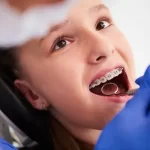Orthodontic treatment plays a vital role in achieving a healthy and beautiful smile. However, there are several myths and misconceptions surrounding orthodontics that can create confusion and uncertainty. In this article, we will debunk common myths and provide factual information to help you make informed decisions about orthodontic treatment. Let’s separate fact from fiction and uncover the truth behind these popular misconceptions.
Myth 1: Orthodontic Treatment Is Only for Children and Teens
Fact: Orthodontic treatment is not limited to children and teenagers. While it’s true that many orthodontic cases are addressed during adolescence, adults can also benefit from orthodontic treatment. The advancements in orthodontic technology have made it possible to achieve great results for patients of all ages. Whether you’re a teenager or an adult, orthodontic treatment can help correct misaligned teeth, improve your bite, and enhance your overall oral health. Visit our page on Orthodontics for Adults to learn more about the benefits of orthodontic treatment for adults in Pittsburgh.
Myth 2: Braces Are the Only Option for Orthodontic Treatment
Fact: While traditional braces are a widely used and effective treatment option, they are not the only choice available. Orthodontics now offers various alternatives to braces, including clear aligners such as Invisalign, ClearCorrect, SureSmile, and Six Month Smiles. These alternatives provide discreet and convenient options for teeth alignment, depending on your specific needs and preferences. To learn more about the different treatment options, visit our page on Aligners vs. Braces.
Myth 3: Orthodontic Treatment Is Painful and Uncomfortable
Fact: While it’s normal to experience some discomfort or mild soreness during the initial stages of orthodontic treatment, modern techniques and advancements have significantly reduced the level of discomfort associated with orthodontics. Your orthodontist will ensure that you are as comfortable as possible throughout your treatment. Additionally, the satisfaction of achieving a beautifully aligned smile outweighs any temporary discomfort you may experience. To understand how orthodontic treatment works and the sensations you may encounter, visit our page on How Do Braces Work?.
Myth 4: Orthodontic Treatment Takes Several Years
Fact: The duration of orthodontic treatment varies depending on the complexity of the case and the type of treatment chosen. While some cases may require more extended treatment periods, many orthodontic treatments are completed within 12 to 24 months. It’s important to remember that orthodontic treatment is a gradual process aimed at achieving long-term results. Your orthodontist will develop a personalized treatment plan and provide an estimated timeline for your specific case.
Myth 5: Orthodontic Treatment Is Purely Cosmetic
Fact: While orthodontic treatment can undoubtedly enhance the appearance of your smile, its benefits extend far beyond cosmetics. Correcting misaligned teeth and bite irregularities improves oral health by facilitating better cleaning and reducing the risk of tooth decay, gum disease, and jaw problems. Orthodontic treatment can also enhance speech, improve chewing efficiency, and prevent excessive tooth wear. It’s essential to recognize that orthodontics contributes to both aesthetic and functional aspects of your overall oral health.
Myth 6: Orthodontic Treatment Is Expensive
Fact: The cost of orthodontic treatment varies depending on the complexity of the case, the treatment option chosen, and other factors. While orthodontic treatment represents an investment in your oral health, it’s important to consider the long-term benefits it provides. Many orthodontic practices offer flexible payment plans and financing options to make treatment more affordable. Additionally, the cost of not addressing orthodontic issues can lead to more extensive and costly dental problems in the future.
Myth 7: Orthodontic Treatment Is Only for Severely Misaligned Teeth
Fact: Orthodontic treatment is not limited to severe cases of misalignment. Even minor orthodontic issues can benefit from treatment. Whether you have crowded teeth, gaps, overbite, or underbite, orthodontic intervention can help address these concerns and improve the overall alignment of your teeth. Early orthodontic treatment, as explained in our Early Orthodontics page, can be particularly beneficial in guiding proper jaw development and preventing more severe issues in the future.
Myth 8: Orthodontic Treatment Causes Speech Impediments
Fact: While it may take a short period of adjustment for your tongue and lips to adapt to the presence of orthodontic appliances, orthodontic treatment itself does not cause speech impediments. In fact, orthodontic treatment can often help improve speech clarity by addressing underlying issues, such as misaligned teeth or jaw discrepancies, that may have been contributing to speech difficulties.
Myth 9: Once Orthodontic Treatment Is Complete, No Further Maintenance Is Required
Fact: After completing your orthodontic treatment, you will be provided with retainers to maintain the results achieved. Retainers are essential to prevent teeth from shifting back to their original positions. It’s crucial to follow the post-treatment care guidelines provided by your orthodontist, which may include wearing retainers as instructed and attending regular follow-up appointments. Our page on Retainers provides detailed information on their role and care instructions.
Separating the myths from the facts is crucial to make informed decisions about your orthodontic treatment. If you have any questions or concerns regarding orthodontics, our team of experienced professionals is here to help. Visit our Contact Us page to get in touch or schedule an appointment through our Appointment Request page.
“Discover the truth behind common myths and misconceptions about orthodontic treatment. Separate fact from fiction and make informed decisions to achieve a healthier and more beautiful smile.” – Contact us today and take the first step towards your orthodontic journey. Our Pittsburgh orthodontics office is accepting new patients.
Remember, each person’s orthodontic needs are unique, and consulting with an experienced orthodontist is the best way to determine the most appropriate treatment plan for you.



